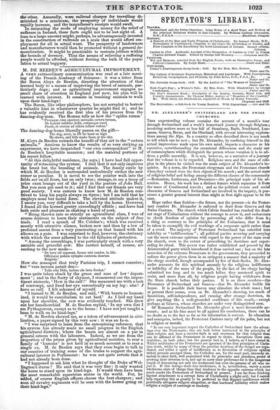M. DE REEDEN'S AGRICULTURAL IMPROVEMENT. A VERY extraordinary communication was
read at a late meet- ing of the French Academy of Sciences : it was a letter from the Baron Aloys de Reeden, directing the attention of that learned body to a means of improving the breed of animals, par- ticularly dogs ; and as agricultural improvement engages no small share of attention in England just now, his plan will be /earned with interest. It consists in teaching animals to walk upon their hind-legs I
The Baron, like other philosophers, has not scrupled to borrow a valuable hint in whatsoever quarter he might find it ; and he has evidently received the first idea of his process from the dancing-dog-man. The Roman tells us how the " opifex rerum',
" Pronaque odin spectent animalia meters. terrain, Os homini sublime dedit, ccelumque tueri Jussit, et erectos ad side's toilers vultus."
The dancing-dog-homo liberally passes on the gift—
The dog, erect, to lilt its head on high He shows, and bids make facts at the sky.
M. Aloys de Reeden extends the benefit of that act to the "cetera animalia." Anxious to know the results of so very striking an experiment, we have despatched "our own correspondent" to M. de Reeden's hospitable mansion ; and the material portions of his report follow. "At this delightful residence, (he says,) I have had full oppor- tunity of witnessing the system. I find that it not only improves the breed but the breeding of animals. The family circle by which M. de Reeden is surrounded undoubtedly strikes the new comer as peculiar. It is novel to see the pointer walk into the fields not on all fours, but on only twos ; strange, to see a troop of prize oxen lounge out of the yard in the posture of John Bull. But you soon get used to it ; and I find that our friends are very good society. I was curious to know how M. de Reeden con- trived to keep his pupils always on tiptoe; but I am told that he employs none but moral force. The elevated attitude makes it I assure you, very difficult to take a bull by the horns. However, I found all the horned gentry exceedingly affable ; and have had both pride and pleasure in shaking a hand of pork. " Beingthrown into so strictly an agricultural class, I was of course desirous to learn their sentiments on the subject of free trade. I read a speech of Mr. Cobden's ; which was received mostly with attentive silence, broken now and then by a low of profound assent from a very penetrating ox that leaned with his elbows on a gate. I was surprised to find, however, the obstinacy with which the asses adhered to the old fallacies of protection.
"Among the assemblage, I was particularly struck with a very amiable and graceful cow. She carried herself, of course, ac- cording to the new mode-
' De hove nil s-nperest, forum nisi candor, in Mt:
Otlicioque pedum nymphe contents duorum Erigitur.'
How she managed that truly Parisian trip, I cannot conceive ; but " vera incessu patuit dee-
' Tans erat Dido, tatlem she keta ferebat.' I was quite taken aback by the grace and ease of her' deport- ment ' ; and in the flurry of shyness, I stammered out the imper- tinent niaiserie, 'How is the calf?' She measured me with a look of contempt, and fixed her eye sarcastically on my leg : alas I I have no calf. I felt ashamed of myself. "I turned to M. de Reeden, and said, 'With beasts so human- ized, it would be cannibalism to eat beef.' As I laid my hand upon her shoulder, the cow was evidently- touched. She drew out her handkerchief. M. de Reeden replied, 'In my own diet I am Pythagoreanz except as to the beans : I have not yet taught a bean to walk on its hind-legs.'
"M. de Reeden showed me, as a token of advancement in civi- lization, a paper signed by this very cow : it was an Io-u.
"I was surprised to learn from the enterprising reformer, that his system has already made no small progress in the English agricultural districts ; where the beasts are almost on a par in general esteem with the labourers. Indeed, as we see from the proportion of the prizes given by agricultural societies, to rear a family of ' humans' is not held in so much account as to rear a single ox. M. de Reeden says that they even begin to talk in our counties of training some of the brutes to support the agri- cultural interest in Parliament : he was not quite certain that it had not already been done. "I happened to ask him what he thought of the Duke of Wel- lington's statue ? He said that it was very fine : it only wanted The horse to stand upon its hind-legs. It would then have been the most remarkable equestrian statue in the world. For, he 'added, of course English officers choose the best chargers ; and soon all cavalry- regiments will be seen with the horses going on their hind-legs."


























 Previous page
Previous page